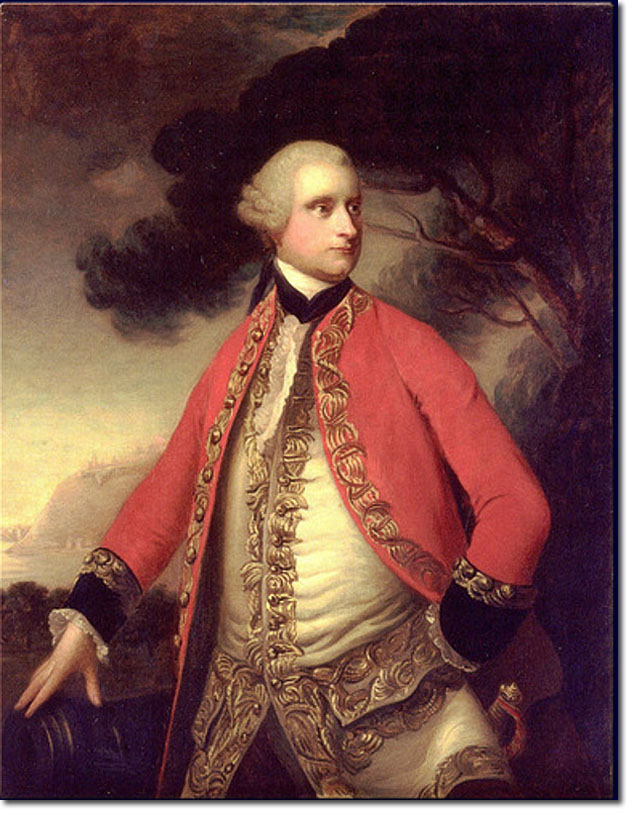|
|


|
|
In 1774 James was appointed lieutenant-governor of Minorca. In April 1779 he was appointed governor of the island, following the death of the non-resident governor, General Mostyn. As the likelihood of war with Spain became apparent, Murray's wife Cordelia returned to England, where she died, childless, on 26 June, soon after her arrival.
Shortly after war broke out with Spain in June 1779 a new lieutenant-governor took post in the person of Sir William Draper, with whom Murray's relations were initially cordial but deteriorated rapidly. In 1781 Minorca was threatened with a siege. Murray sent off his young second wife, Anne and their infant daughter, to Leghorn. He then prepared for a defence of Fort St Philip, which dominated Minorca's great natural harbour. On 20 August he was blockaded by 16,000 French and Spanish troops under the duc de Crillon, a French commander who had been taken into the Spanish service. Murray's garrison consisted of only just over 2000 regular troops, 400 of whom were invalids, and all more or less unhealthy, as well as 200 seamen from a sloop scuttled earlier. His meritorious conduct during the siege earned him the nickname Old Minorca from his troops. Despairing of reducing the place, which had formidable fortifications, de Crillon secretly offered Murray a bribe of 1 million sterling to surrender. Murray spurned the insult. On 16 October 1781 he wrote back to de Crillon, in French: when your brave ancestor was desired by his sovereign to assassinate the Duc de Guise he returned the answer that you should have done when the King of Spain charged you to assassinate the character of a man whose birth is as illustrious as your own or that of the Duc de Guise. I can have no further communication with you except in arms. De Crillon replied: 'Your letter restores each of us to our place; it confirms the high opinion I always had of you' During the last four months of the siege relations between Murray and Sir William Draper deteriorated over arguments as to the limits of their operational authority, to the point that Sir William was relieved of his command in January 1782. On 5 February Murray's garrison was so reduced by the ravages of scurvy that only 600 men remained partially fit for duty. A capitulation was arranged and the remnants of the garrison marched out between two lines of French and Spanish troops, and laid down their arms declaring 'they had surrendered them to God alone as the victors could not plume themselves in taking a hospital'. On returning to England Draper offered twenty-nine miscellaneous charges against Murray, who was tried by a general court martial presided over by Sir George Howard, which sat between November 1782 and January 1783. The court fully and honourably acquitted Murray of all the charges levelled against him except two. The issue of an order 'derogatory to his lieutenant-governor' and some interference with auction dues on the island, for which it sentenced him to be reprimanded. The King would come to his aid saying: 'in consideration of the zeal, courage and firmness with which General Murray appears to the court to have conducted himself in the defence of Fort St Philip, as well as his former long and approved services, His Majesty has been pleased to dispense with any other reprimand.' Immediately afterwards, a Mr Sutherland brought an action against Murray for illegal suspension from the office of judge of the vice-admiralty court of Minorca. The matter had been referred home and the king had approved Murray's action, but a jury gave damages against him to the amount of 6000 pounds. On 6 May 1785 the House of Commons, acknowledging Murray's long career of service, decided that the damages, and Murray's costs, should be paid out of public funds. |
Minorca | Minorca Administrators
Armed Forces | Art and Culture | Articles | Biographies | Colonies | Discussion | Glossary | Home | Library | Links | Map Room | Sources and Media | Science and Technology | Search | Student Zone | Timelines | TV & Film | Wargames